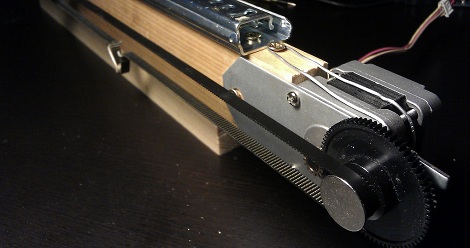
[Raul] built a cheap linear actuator out of a drawer slide and a surplus flatbed scanner.
A few builds we’ve seen, like the PCB drill press or the horribly inefficient thermostat, used linear actuators as key components of their builds. These linear actuators are fairly expensive compared to other parts we usually have lying around so going the homebrew route to reduce costs is always a welcome idea.
The first step of [Raul]’s build is to mount a drawer slide to a piece of wood. A stepper motor is attached to one end of the actuator and a timing belt is strung along the length of the assemblage. After a bracket is connected the drawer slide and the belt, you’ve got a very inexpensive linear motor.
In our days of dumpster diving, we can’t count the number of times we’ve passed up on drawer slides in unwanted furniture. Stepper motors, gear trains and timing belts from old ScanJets can be found for pocket change any day of the week. For cheap and accurate linear motion, we couldn’t come up with a build that does better than [Raul]’s.















Need to change the headline to linear actuators not linear motor.
Seconded
These could be useful, depending on your need. I highly doubt these would have the umphf to drive a racing simulator or be strong enough to last with repetitive use. There is a reason linear actuators
are expensive and that has to do with the high precision parts they use, like the ball screw.
Not to discount your effort, these would be great in quite a few sitiuations, just sadly not a racing simulator with is what I really want linear actuators for.
Also, check out http://buggies.builtforfun.co.uk/Sim/linear-act.html , they seem to be very well built and pretty cheap. You can look at the overview pics and get a pretty solid grasp of how to build them.
You’re grammar nazi correct
Nice build, cheap and easy, but since I’m Older than Dirt and slow sometimes, what can I do with it
I’ve got exactly the same assembly here but I’ve lost that damn toothed belt. Any idea what type it is?
Could someone give me an example of what this is used for?
Anything that needs precision linear motion.
Could be opening and closing the draft flap on your chimney for example.
if you want beefier stuff, consider old laser printers. They had lots of goodies, IIRC.
Also, for bigger motors, see automobile window winders and windshield wiper motors.
and Old satellite antenna actuators.
Really big? how about the starter motor out of a car?
REALLY big? Now you’re talking about surplus CNC servo motors, maybe.
Window lifter mechanisms salvaged from cars can be a good alternative. Regular single tracked ones work the same as this except the actuator is a DC motor. Dual tracked ones for frameless doors use two tracks and cris-crossed bowden cables on pulleys to maintain a rigid parallel motion.
Downside is that the tracks often have a curve to match the side profile of the glass.
I’ve converted two of those drives into servo actuators. They come with hall switches (2 channels acting as a quadrature encoder) and a magnetic encoder ring that generates 4-8 pulses per revolution so they can detect stall conditions / hands in the window.
A resolution of 2-3° can be obtained so this is only suitable for driving a spindle. Having come this far, I’ve dumped the idea and bought two beefy 3Nm stepper motors.
Believe it or not, halfway decent drawer slides can be pretty expensive at your local hardware store. If you can wait a few days, I’d recommend going on eBay and buying a pair of rackmount server rails. Generally, those suckers are very sturdy and designed to hold a much heavier load than a drawer rail. You can get a pair for less than 20 bucks. Trust me, you wont be disappointed! (I’ve even replaced some drawer rails with server rails – like the pull out cabinet that holds our kitchen garbage cans).
Making use of salvaged parts, nice!
An X-Y plotter would be a nice project to use this in